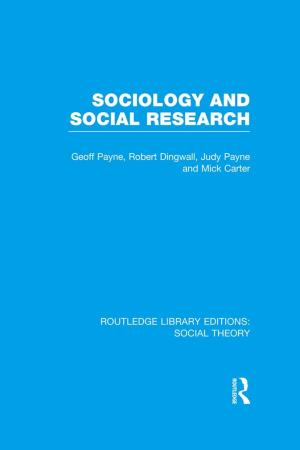Household Vulnerability and Resilience to Economic Shocks
Findings from Melanesia
Nonfiction, Science & Nature, Science, Earth Sciences, Geography, Social & Cultural Studies, Social Science| Author: | Simon Feeny | ISBN: | 9781317121053 |
| Publisher: | Taylor and Francis | Publication: | July 22, 2016 |
| Imprint: | Routledge | Language: | English |
| Author: | Simon Feeny |
| ISBN: | 9781317121053 |
| Publisher: | Taylor and Francis |
| Publication: | July 22, 2016 |
| Imprint: | Routledge |
| Language: | English |
Focusing on the vulnerability and resilience to economic shocks at the household level, this book draws on extensive research activities carried out in two Melanesia countries: the Solomon Islands and Vanuatu. In particular, it identifies the household impacts of the recent food, fuel and economic crises. The contributors also examine resilience by identifying how households responded to these recent economic events in order to cope with their impacts. Findings indicate that households are vulnerable to a range of shocks and often struggle to cope with their impacts. Shocks are making it harder for households to meet their basic needs. Households in Melanesia are facing increasing demands for money, in particular for school fees, basic foodstuffs and customary obligations. Concurrently, there are limited domestic opportunities for formal employment. Traditional social support networks are strong and are an important form of resilience. However, there is evidence that they are disintegrating. Of particular focus are the gendered impacts. Women are found to bear a disproportionate share of the burden in adjusting to household shocks. The authors highlight key areas in which public policy and development programmes can reduce household vulnerability and increase their resilience to future economic shocks.
Focusing on the vulnerability and resilience to economic shocks at the household level, this book draws on extensive research activities carried out in two Melanesia countries: the Solomon Islands and Vanuatu. In particular, it identifies the household impacts of the recent food, fuel and economic crises. The contributors also examine resilience by identifying how households responded to these recent economic events in order to cope with their impacts. Findings indicate that households are vulnerable to a range of shocks and often struggle to cope with their impacts. Shocks are making it harder for households to meet their basic needs. Households in Melanesia are facing increasing demands for money, in particular for school fees, basic foodstuffs and customary obligations. Concurrently, there are limited domestic opportunities for formal employment. Traditional social support networks are strong and are an important form of resilience. However, there is evidence that they are disintegrating. Of particular focus are the gendered impacts. Women are found to bear a disproportionate share of the burden in adjusting to household shocks. The authors highlight key areas in which public policy and development programmes can reduce household vulnerability and increase their resilience to future economic shocks.















